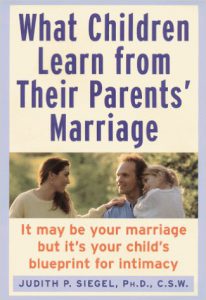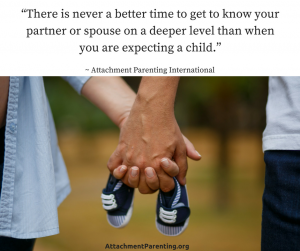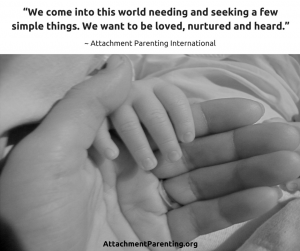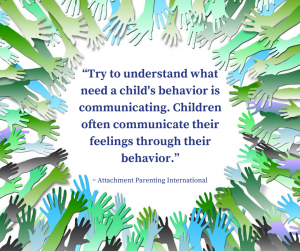Category: APtly Said
All babies are born with these 3 emotional needs
How an insecure childhood attachment affects a marriage…and what you can do about that
Positive discipline: The ‘golden rule’ of parenting
“From the attachment parenting perspective, positive discipline embodies the ‘golden rule’ of parenting: In other words, treat children the way you would want to be treated if you were the child.
Positive discipline is an overarching concept based on the understanding that when a child is treated respectfully within loving, age-appropriate boundaries, he will develop a conscience guided by his own internal discipline and empathy for others.
Positive discipline is rooted in a secure, trusting, and loving relationship between parent and child.” ~ Attached at the Heart: Eight Proven Parenting Principles for Raising Connected and Compassionate Children
by Barbara Nicholson & Lysa Parker
Learn 25 tried-and-true tips for positive discipline, and so much more in this definitive guide to attachment parenting written by API’s cofounders. Purchase your copy through the Amazon link above to have a portion of the proceeds benefit Attachment Parenting International.
6 tips for talking politics with children
 The present political discourse around our nation is undeniable as it is inescapable. We can see, hear, and feel the tension on the airwaves and social media, in the energy that surrounds us and the air we breathe. It’s transcending beyond the political realm –into the social and our everyday encounters.
The present political discourse around our nation is undeniable as it is inescapable. We can see, hear, and feel the tension on the airwaves and social media, in the energy that surrounds us and the air we breathe. It’s transcending beyond the political realm –into the social and our everyday encounters.
Regardless of one’s convictions or political views, I’m certain that we can all agree that it seems as though the pot has been heating up for quite some time: The flames have been gradually rising and the water is now boiling…about to dangerously spill over.
I’m concerned about the “spilling over” effect of this political climate and its overall impact in our society — on our children.
Time to Listen
For the past year I’ve been following the political coverage on TV, reading articles from a variety of sources all across the political gamut, observing and engaging in social media discussions, and interacting with people from diverse political affiliations. Time and time again, I keep thinking in frustration: No one listens to one another, the door to collaboration and cooperation has been shut tight, and worst of all, there is little to no effort to try to understand each other’s point of view.
I would like to state clearly that I believe we don’t necessarily have to agree with one another, but it’s imperative that we at least listen and try to understand one another. Most of us want and wish the same for ourselves, our family, and our nation — though we clearly disagree on the avenues to accomplish it.
I wholeheartedly believe that listening and understanding are key components in creating tolerant and peaceful environments, both at home and beyond — in our communities and nation.
It feels as though there are two different, opposing camps on opposite sides of our country with the road between them nearly completely blocked. There is minimal communication and flow between the two camps.
It Starts At Home
As that image made itself into my mind one day, I chuckled because at times I feel like there are two opposing camps in my own house: my 11-year-old daughter and my 9-year-old son. Their personalities, interests, and habits are polar opposites. Yet, we are a family living under the same roof, and we share a special, sacred bond. To keep the peace and harmony in my house, I have to ensure the road between the two “camps” is wide open and well-traveled.
It has been a challenging task. I have been exploring different avenues to teach my kids to respect one another’s differences, to listen and keep the communication flowing, and to use their differences as a nurturing platform to strengthen one another, rather than diminish each other. We are a family — it’s imperative that we bridge our differences in spite and despite of them all. I wish the same for our nation and our children — because at the end of the day, we are one big family.
Attachment Parenting International supports collaboration and cooperation in the parent-child relationship, as well as nonviolent communication, listening and respect. Following such practices fosters understanding, harmony, and a strong bond – which in turn reduce tensions conflicts within the family structure.
In my role as a parent, I learned the importance of listening and trying my best to understand the true expressions of my kids’ behaviors –what thoughts and emotions are manifested through their behavior.
For example, as I observed my 12-month-old daughter become increasingly irritated and frustrated, I explored and suspected that her inability to verbally communicate contributed to her discontent. Seeking solutions, I embraced sign language to alleviate her inability to communicate effectively, and she had transformed and blossomed into a content, happy child.
With my younger son, I needed to understand that his needs and learning habits are vastly different than those of his older sister. Once I understood and accepted that, I was able to explore and implement different ways of approaching challenges that we encountered. Consequently, his schoolwork and overall behavior at home improved drastically.
Striving to understand why our children behave in certain ways and listening to them doesn’t necessarily mean we accept or support certain behaviors but rather, it means that we are better equipped to diffuse our frustrations and seek effective solutions. For instance, we understand that it is developmentally appropriate for a 12-month-old baby to shriek and throw a tantrum when they are frustrated due to their inability to communicate verbally and be understood. It gets us closer to minimizing conflicts and finding solutions.
Talking To Our Children About Politics, And Other Uncomfortable Topics
As a mother of 2 children and an individual who advocates for peaceful existence for our children, I’m concerned for our nation but, as importantly, about the inflamed political and social tone our kids are surrounded by.
 Conflicts and struggles can present great opportunities for learning and growth. We can seize the current political climate as an invitation to open the door to valuable and applicable conversations with our children.
Conflicts and struggles can present great opportunities for learning and growth. We can seize the current political climate as an invitation to open the door to valuable and applicable conversations with our children.
Here are some discussion points and contemplations that can help steer the conversation in the right direction — keeping in mind subject matter and language ought to be age-appropriate:
- Family Values — Clarify your own family values. It’s a good opportunity to emphasize your belief system, ideals, and priorities.
- Listen — Sometimes as parents we can get caught up in expressing our own views and feelings that we neglect to ask our children how they feel or think. Just ask them about their own thoughts and feelings. Make sure to create a comfortable space for them to form and share their own opinions, even if they differ from yours.
- Bullying –Most kids have likely been exposed to the past election cycle’s political debates, ads, and mudslinging. This can open the conversation about how and why some adults and kids mistreat or bully each other.
· What are some constructive ways kids can use to deal with everyday bullying scenarios at school or the playground?
· When kids witness a peer being bullied, how can they best diffuse the situation? - Honesty — Some delicate and divisive subjects, such as racism, terrorism, war, and poverty, can be challenging to discuss and uncomfortable. Our children expect and deserve our honesty. Children’s books and movies can be helpful tools to aid the conversation.
- Accept and respect differences — Our differences can strengthen or weaken us. It is important that we emphasize to children that different people come from different backgrounds and experiences in life and, as such, their values and points of views may be at odds with our own.
· What are some scenarios where children encounter differences?
· What are respectful and peaceful ways they can practice to bridge their differences? - Humor — Humor and laughter can be beneficial by lightening up a mood and reducing stress and anxiety. Political humor is one of the hallmarks of a free society. You can share with your kids age-appropriate political cartoons and watch comedy together.
· An important point to highlight: When does funny get to a point of not-so-funny-anymore, harsh, or even abusive?
Our kids observe and learn from our behavior as we are their most significant role models. As such, we ought to engage in introspection and investigate our own conduct — demonstrating to them that we are fostering a tolerant environment for them as well as our nation.
I can think of very few things that are more paramount than nurturing our children for a compassionate world. It’s our responsibility to illustrate to them that we know better, we can do and be better — individually and collectively — as one big family.
Weekly Reflection: Voicing your opinion goes a long way
This week’s API Reads Weekly Reflection focuses on the importance of parents voicing their opinions to their partner in a competent way. As you read the quote, take time to reflect on what it means to you, how you can incorporate its meaning into your family, and how it encourages you:
“Children who watch both parents competently voice their opinions realize that both men and women have something important to contribute. Research studies show that when parents are able to disagree without becoming angry, the children are rarely affected in adverse ways. In fact, children from these homes do better in school and have higher self-esteem than do children whose parents’ negotiations of differences escalate into bickering and hostile fights. Children who watch their parents communicate effectively and respectfully are able to more successfully negotiate with peers and have an important headstart in knowing how to resolve differences productively in the intimate relationships they will develop when they grow older.” (Page 136 of 210 in eBook edition)
 What Children Learn From Their Parents’ Marriage: It May Be Your Marriage, but It’s Your Child’s Blueprint for Intimacy” by Judith P. Siegel PhD
What Children Learn From Their Parents’ Marriage: It May Be Your Marriage, but It’s Your Child’s Blueprint for Intimacy” by Judith P. Siegel PhD
Children communicate their needs through behavior…what is your child communicating?
API Reads Monthly Top 5 for January
“API Reads Monthly Top 5,” is a new series from the API Reads program, where Attachment Parenting International will post our top 5 quotes from a compilation of resources currently being reviewed by the team.
Editor’s Note: Even though these quotes have stood out to the reviewers, the resource is still under review. Please use your discretion when reading these resources on your own. We cannot guarantee that there are no conflicts with API’s philosophy, mission, or principles until the resource has been completely reviewed. Be sure to check APedia (soon to be launched) at a later date to see the final summary from the reviewer.
Each of this month’s Top 5 quotes from from the ebook, What Children Learn From Their Parent’s Marriage: It May Be Your Marriage, But It’s Your Child’s Blueprint for Intimacy by Judith P. Siegel PhD.
1) Page 2 —
“The truth is, most children are aware of many ‘private’ exchanges their parents assume are beyond their comprehension — a small gesture of comfort, a hostile glance. While your children may not be talking to you about what they are learning, they are drawing conclusions about ‘what happens’ to people who are married.”
2) Page 7 —
“Even when a person is exposed to a different environment in adulthood, he or she continues to hold on to the beliefs, values, and expectations acquired in the childhood home.”
3) Page 36 —
“Sleep deprivation usually adds to the mother’s experience of being exhausted and overwhelmed. Because the baby’s demands are real and urgent, it is normal for her to put her own needs second. But learning how to prioritize and balance her husband’s need for her is complicated and stressful. Although most new fathers are thrilled with the addition to the family, they are not prepared to lose their intimacy with their partner. If the couple is not able to find time to be alone together, the relationship suffers in important ways.”
4) Page 42 —
“Children and teens who are overly involved with a parent have a harder time growing up. Problems persist into adulthood, and the grown children often repeat their parent’s reliance on self-interests, extended family, or work to bring them happiness.”
5) Page 42 —
“Establishing the priority of the marriage does not mean that all other commitments and loyalties are tossed aside, but it does mean that the partner’s needs are constantly kept in sight. Even when there are competing demands, the partner and the marriage are respected. If parents want their children to find happiness in life from a wife or a husband, they must look at the message they are sending by the example of their own marriage. A marriage that can be protected from the demands of other obligations is not taking away from the children; it is giving to them the expectation and hope that one day they, too, will have a loving partner.”





